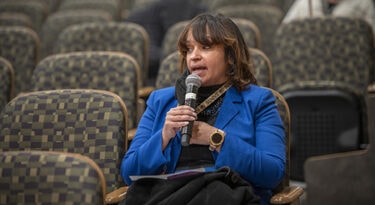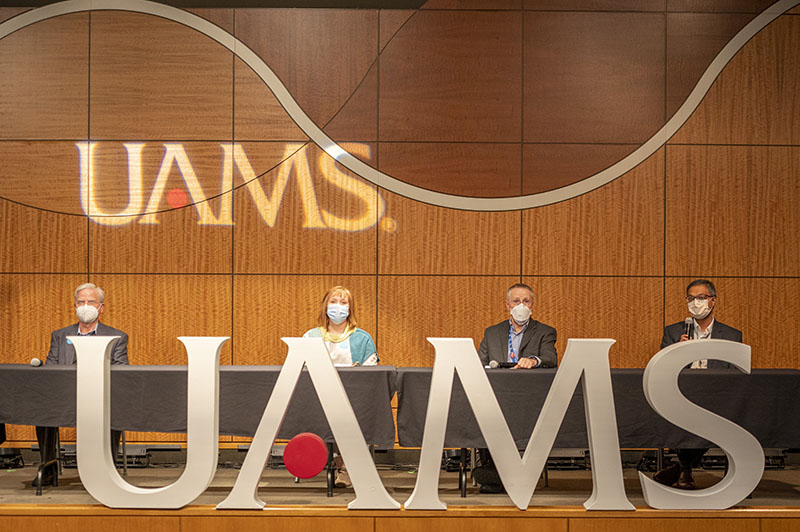View Larger Image

UAMS Chancellor Cam Patterson asks a question at the Jan. 7 Town Hall meeting.
Image by Evan Lewis
COVID-19 Impact, Response Remain Center Stage at Chancellor’s Town Hall
| A year ago, many hoped the fight against the COVID-19 would be won or near victory by this point and would not have expected that the pandemic would be the focus of the first Chancellor’s Town Hall meeting of 2022.
“This year did not start off the way we wanted it to,” UAMS Chancellor Cam Patterson, M.D., MBA, said at the Jan. 7 meeting, which drew an online audience of 1,200. “Omicron has had an impact across our state. It has had a substantial impact at UAMS. We have a substantial number of employees who are on work restriction. Many are quarantined with infections. We are concerned about them and wish them well. We look forward to welcoming them back.”
Watch the complete video of the Town Hall meeting. Presentations begin at 41:00 minutes.
The most recent surge in COVID-19 cases, many of them likely caused by the new Omicron variant, has resulted the very long lines of vehicles at the UAMS drive-thru testing station on the Little Rock campus, perhaps the longest since the start of the pandemic.
Patterson thanked Arkansas Gov. Asa Hutchinson for his recent visit to the drive-thru and for assigning several members of the Arkansas National Guard to help with testing there.
With several hundred UAMS employees on work restriction or quarantined at home because they are infected with the virus or have been exposed to it, employees on campus and off have been putting in extra hours or have been redeployed to work in areas new to them to fill in for absent coworkers.
“The stress we all are under is unique to this particular time,” Patterson said. “I know everyone is working hard and maybe even harder than usual. Some of you feel like you are doing two or three jobs at once. We understand that, and we get that. We want to provide all the resources we can to ensure you are healthy, strong and resilient. More than anything else we want to thank you for the job you are doing for Team UAMS.”
Steppe Mette, M.D., UAMS Medical Center CEO and senior vice chancellor of UAMS Health, said 7-8% of employees in “clinical facing positions” are out because of the virus. COVID-19 patients in the UAMS Medical Center are being consolidated into units to make the care for them more efficient, and UAMS remains ready to cut back on elective procedures that are not time sensitive, whether done in an operating room or not.
Supplies of personal protective equipment (PPE) and equipment like ventilators are good, he said, adding that so far UAMS has not experienced some of the supply chain problems other health care providers have.
“Overall, I think we are doing as well as we could hope for,” Mette said. “We are doing better than many other organizations, not only in Arkansas but around the country. We should be proud of our response to COVID. Of course, the concern is with what is unknown and the rapidity with which COVID has infected Arkansans. Our positivity rate now is around 34- 38%. To put that in perspective, we were running 10%, maybe a high of 13%. So, three times that positivity rate in the early stages of the pandemic.”
Supplies of monoclonal antibodies that are effective against Omicron are in short supply as are antiviral drugs that are effective in helping patients recover, said Michelle Kraus, M.D., MPH, professor in the Division of Nephrology in the UAMS College of Medicine Department of Internal Medicine.

Danielle Lombard-Sims at the Town Hall meeting answers a question from a member of the online audience.
Immunocompromised pediatric patients between 5 and 11 years of age now are allowed to get a third vaccine dose as soon as a month after their second shot, Krause said.
She urged everyone who can get a booster shot to do so, as did other members of the Town Hall panel — Robert Hopkins, M.D., professor and division director of General Internal Medicine and chair of the National Vaccine Advisory Committee to the U.S. Department of Health & Human Services, and Keyur Vyas, M.D., professor in the Division of Infectious Disease in the UAMS College of Medicine Department of Internal Medicine.
Vyas said UAMS is looking at the possibility of using health care grade masks across all UAMS campuses.
“However, what we are seeing is not exposures from our patients when we take all the appropriate measures,” Vyas said. “We are seeing transmission to our employees from the community and interactions between employees without appropriate PPE such as in breakrooms and offices.”
Before the panel discussion, Stephanie Gardner, Pharm.D., Ed.D., UAMS provost and chief strategy officer, presented an update on the implementation of Vision 2029, UAMS’ 10-year strategic plan.
She said two years into the plan, the institution is making great progress. During this period, UAMS saw large increases in research funding; already reached its 10-year goal for the number of telehealth visits; established the UAMS Health statewide health system; and made significant progress in the construction of a new surgical hospital and a new Radiation Oncology Center.
The National Institutes of Health (NIH) recently awarded $18.9 million in funding to UAMS researchers Carol Cornell, Ph.D., and Pebbles Fagan, M.D., MPH. They briefed the Town Hall about the good news.
Cornell is professor and chair of the Department of Health Behavior and Health Education in the UAMS College of Public Health and director of the NIH-funded Arkansas Center for Health Disparities. Fagan is a professor and director of the Center for the Study of Tobacco in the UAMS College of Public Health.
The five-year federal grant will establish the UAMS Center for Research, Health and Social Justice which will fund research, training and community engagement aimed at reducing cancer and cardiovascular disparities among people who live in rural areas and African American populations statewide.
The overall goals of the center are to:
- Advance the science of chronic disease health disparities through multidisciplinary team science to improve cancer and cardiovascular outcomes.
- Facilitate research and training opportunities to strengthen the capacity of researchers and community members to develop interventions that reduce cancer and cardiovascular disease disparities using social justice principles.
- Support academic-community partnerships to address the root causes of chronic disease disparities among African Americans and in rural areas in the state.

Steppe Mette, left, Michelle Krause, Robert Hopkins and Keyur Vyas discuss and answer questions about COVID-19 at the Town Hall.